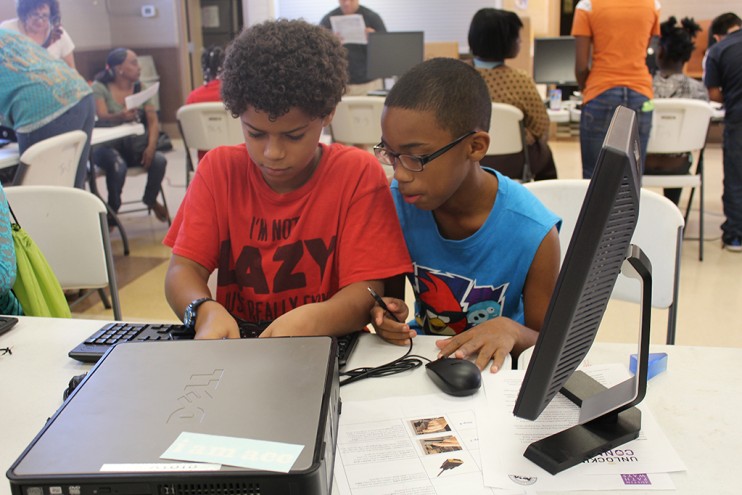As told by Catherine Crago, Strategic Initiatives and Resource Development
The Housing Authority of the City of Austin (HACA) is a high-performing housing authority per the U.S. Department of Housing and Urban Development (HUD), receiving top marks on a variety of measures every year.
As far back as 2001, HACA went beyond its mission to provide safe, decent affordable housing by establishing the HACA Scholarship Fund. Today, the agency has awarded more than $1 million in scholarships.
And many HACA residents who received scholarships have moved out of public housing and into market-rate housing, leaving a place for the next family in need. Today, these scholarship recipients are serving the public as prominent members of the community. In 2010, HACA officials began to realize there were other supportive services, besides scholarships, that would benefit public housing residents. The HACA Scholarship Foundation was rebranded Austin Pathways.
Then in November 2014, as a result of a simply stated but ambitious goal in HACA’s strategic plan, the Unlocking the Connection program became the flagship of Austin Pathways. The program’s goal was to connect every public housing authority resident with free basic broadband internet, digital literacy, and a refurbished computer device. With Unlocking the Connection, came a partnership with Google Fiber and $300,000 in catalytic funding for digital literacy and staffing from the Ford and Open Society Foundations. Within weeks, a variety of Austin companies signed up to close the digital divide in Austin’s public housing.
Austin Pathways was at a pivotal moment and in a perfect position to renew and to craft a unique and powerful vision as to how to serve residents of public and affordable housing on their pathways to self-sufficiency and better quality of life.
Enter IBM’s Impact Grant.
In January 2015, two IBM consultants conducted extensive interviews of HACA and Austin Pathways executives, the HACA Board of Commissioners, and stakeholders, followed by a two-day workshop for 20 HACA and Austin Pathways staff and board members. Together we revisited Austin Pathways’ mission and vision, evaluated our values and answered key questions: What are the unique things that Austin Pathways can do for HACA residents that HACA alone cannot?; What are the unique strengths and weaknesses Austin Pathways brings to the HACA portfolio?
The methodical and deliberate process the IBM consultants used to create a plan was truly the best of every stakeholder’s thinking, that teased out important conflicts and differences of opinion has provided the roadmap from which we could define our future vision.
Four key goals emerged from single statements developed in our visioning exercises. Our achievements since then are grounded in our original plan:
Increased the diversity and level of funding from corporate sponsorships and grants.
We are thrilled to now be one of the organizations to which IBM employees may give as a part of its annual Employee Charitable Contribution Campaign. In July 2015, we were named a Mentor City to 28 other communities participating in a White House – HUD initiative based on the Unlocking the Connection program. This meant an increased ability to benchmark with other housing authorities to increase our understanding of how to most effectively serve HACA clients, and increased exposure to corporate and other partners that help them.
Increase our reach with innovative programs and partnerships.
We’ve touched 30 percent of about 1,900 HACA public housing residents with educational support, digital literacy, free basic and high-speed internet, and earned refurbished computer devices.
Build organizational capacity through partnerships.
Our clients are today closer to self-sufficiency in part thanks to a partnership with Austin Community College. We are proud to host six to 10 full-time equivalent paid interns each quarter who bring their own innovation and hard work to support people in public housing. In October, we learned National Technology Empowerment Network (NTEN) awarded us a Digital Inclusion Fellow focused solely on helping people in public and affordable housing to realize the dream of integration in the digital economy.
Address cross-cutting systemic barriers to self-sufficiency, like transportation and energy.
The Next Century Cities Charles Benton Next Generation Engagement Award is a $30,000 grant that enables us to help residents learn how to use digital tools to navigate transportation, make better transportation decisions, and advocate for their needs with City of Austin officials and transportation companies. And as a part of IBM’s smart cities offerings, we’re exploring how to use big data to help Housing Choice Voucher (Section 8) clients quickly find housing in areas closer to better opportunities for their families.
Lewis Carroll said, “Any road will get you there if you don’t know where you are going.” Having our strategic plan in writing has been a boon. But it’s our shared understanding of and trust in the plan that has given our plan longevity.
Thanks to IBM, and especially to Beth F. Tracy, IBM Corporate Citizenship Manager, for an actionable Strategic Plan that is advancing our mission of work!
